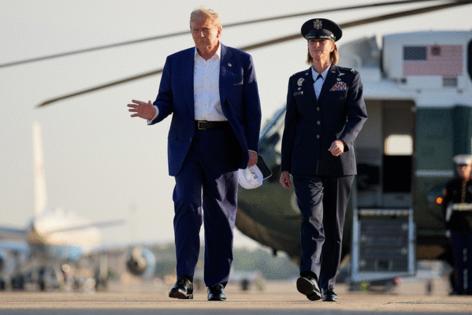Trump's Iran strike follows pattern of presidents asserting authority
Published in Political News
WASHINGTON — President Donald Trump’s decision to bomb Iranian nuclear facilities over the weekend falls in a decades-long tradition of military strikes of debatable legality that the other branches of government have been unwilling or unable to check, experts said.
The Constitution gives Congress the power to declare war, while a 1973 law called the War Powers Resolution was meant to limit a president’s authority. The bipartisan objectors to Trump’s strikes in Iran argue that he violated both the Constitution and the law.
But presidents for years have asserted ever-broader readings of their power to direct military strikes. Courts have proved unwilling to question presidential uses of military force, and it would now likely take a veto-proof majority to counter strikes such as those on Iran, experts said.
It appears Trump did not meet the requirements of the 1973 law, which requires congressional consultation within 48 hours of strikes. It also limits the power to use the military in three circumstances: a formal declaration of war, a specific law passed by Congress or “national emergency created by an attack upon the United States.”
On CBS’s “Face the Nation” on Sunday, Rep. Thomas Massie, R-Ky., argued that “there was no imminent threat to the United States” that would authorize a strike under that law. Massie, along with Rep. Ro Khanna, D-Calif., have offered a resolution to invoke the War Powers Resolution and stop U.S. involvement in Iran.
Sen. Tim Kaine, D-Va., has said he would offer a similar provision in the Senate. The situation remains in flux this week, as Kaine and others have said they intend to force a vote on their measures, and the Trump administration is scheduled to provide classified briefings starting Tuesday.
House Minority Leader Hakeem Jeffries, D-N.Y., told reporters on Monday that he has not received a briefing about the justification for the strike. Jeffries said the country is in a “dangerous moment” and that the Trump administration has a responsibility to bring its justifications to Congress.
“We continue to demand that the administration present itself before the United States Congress and make the case to the American people as to why this extraordinary step had been taken,” Jeffries said.
Republicans who defend Trump have pointed to an undefined constitutional authority to defend the country separate from the War Powers Resolution. On NBC’s “Meet the Press” on Sunday, Sen. Lindsey Graham, R-S.C., said Trump was “within his Article 2 authority” as president to authorize the strikes.
“Congress can declare war or cut off funding,” Graham said. “We can’t be the commander in chief. You can’t have 535 commander in chiefs.”
Many Republicans, particularly in leadership positions, have backed Trump’s strikes — making efforts to check Trump an uphill climb.
Speaker Mike Johnson, R-La., who backed the strikes over the weekend, told Reuters on Monday that he would not support the House considering a resolution on presidential war powers. “I don’t think this is an appropriate time,” Johnson said.
“The President made an evaluation that the danger was imminent enough to take his authority as commander in chief and make that happen,” Johnson told Reuters.
Senate Majority Leader John Thune, R-S.D., described the strikes as “precise and limited” in a floor speech Monday, saying they upheld a “long-held national security imperative” that Iran not have a nuclear weapon.
‘Facts on the ground’
Over the years, the legally complicated questions of presidential powers have taken a back seat to what Claire Finkelstein, a professor at the University of Pennsylvania law school who specializes in national security law, called the “facts on the ground.”
Finkelstein said presidents have asserted a “very broad” reading of the president’s powers, and that argument wins by default unless Congress does otherwise.
“So, from the facts on the ground, historical practice of the three branches, I think it’s impossible to say that presidents do not have the authority to engage in this kind of short-term military operation without congressional authorization,” Finkelstein said.
And Congress, in fact, hasn’t done much to check presidential assertions of authority over military strikes, Finkelstein said.
“Congress, look, you can hop up and down all you want, but what are you doing about it, right? It’s been years and years and years of calm congressional quiescence around war powers or authorizations,” Finkelstein said.
Finkelstein also pointed out that the courts have proved unwilling to question presidential uses of military force, effectively putting the ball back in Congress’ court.
In 2000, the U.S. Court of Appeals for the D.C. Circuit rejected a lawsuit from members of Congress arguing that President Bill Clinton had violated the War Powers Resolution for involving U.S. forces in what was then Yugoslavia.
In that case, the judges wrote that “congressmen may not challenge the President’s war-making powers in federal court” and said Congress itself had power over whether Clinton could continue his military involvement abroad.
Michael Ramsey, a law professor at the University of San Diego law school, said the framers initially meant to have a tight leash on the president’s ability to engage the U.S. in foreign conflicts. But there’s “a sort of more evolving view of the Constitution” in the modern era, after actions such as the Obama administration’s assertion of a constitutional authority to justify strikes in Libya in 2011.
“I think that you may well see that the president’s on stronger grounds, because this is not far out of line of things that presidents have done in the recent past,” Ramsey said.
Congress tried to reel in Trump in his first term, passing legislation to invoke the War Powers Resolution and end U.S. involvement in Yemen in 2019. Trump vetoed it, and the bill did not receive the two-thirds support needed to override the veto.
©2025 CQ-Roll Call, Inc., All Rights Reserved. Visit cqrollcall.com. Distributed by Tribune Content Agency, LLC.

























































Comments